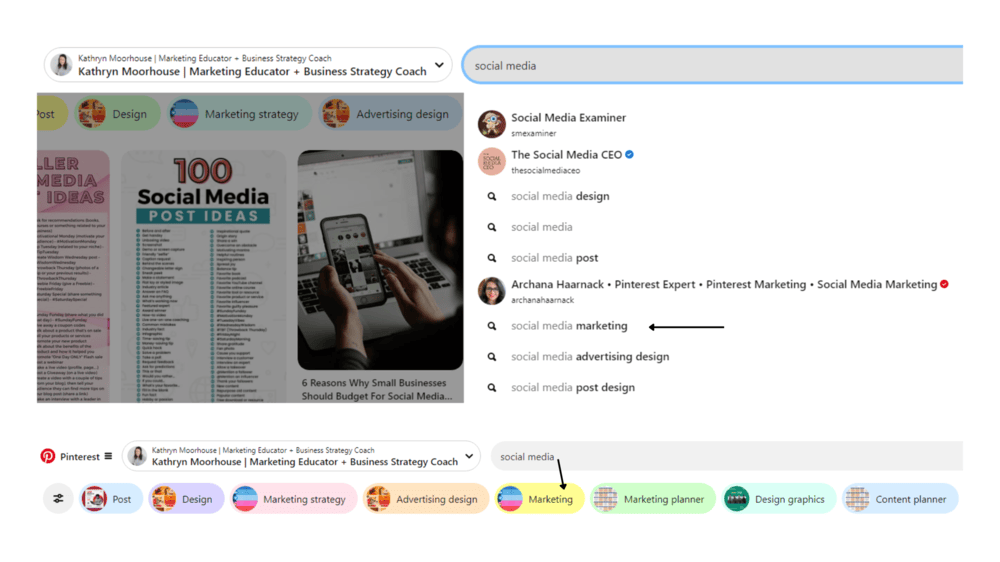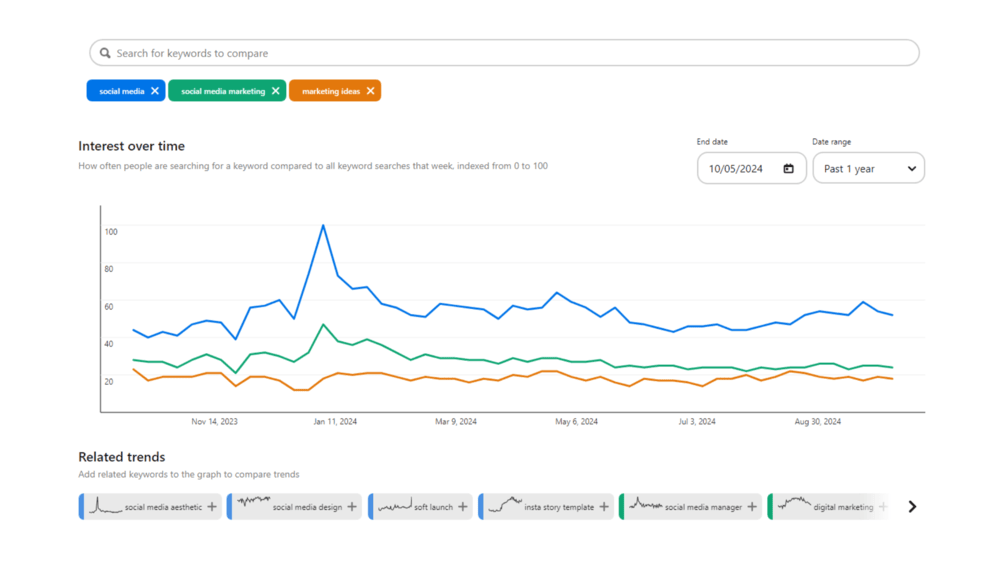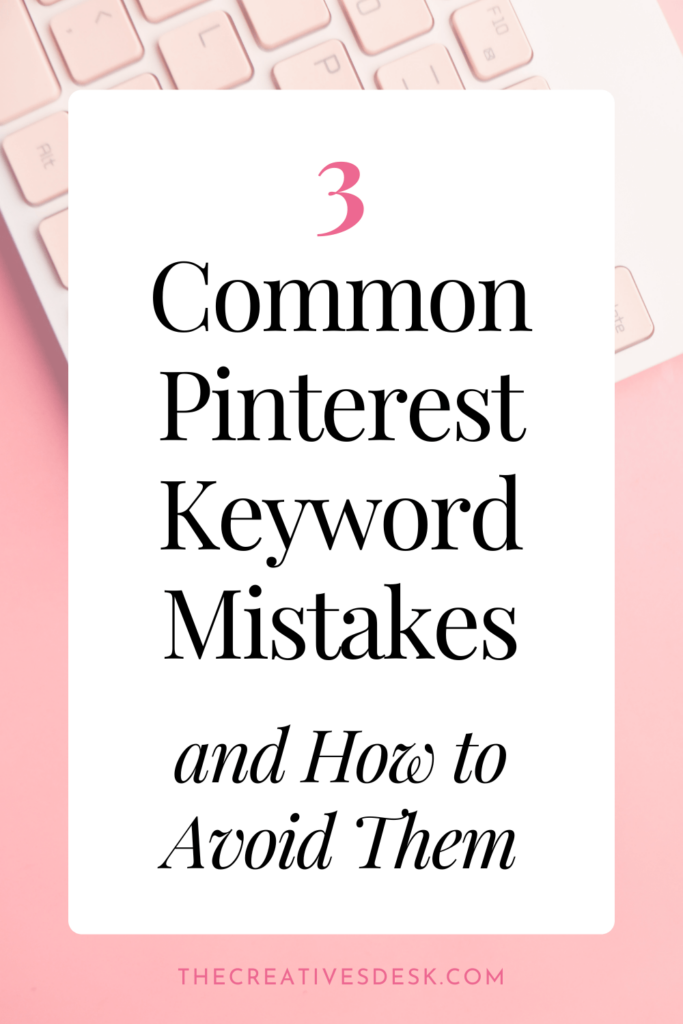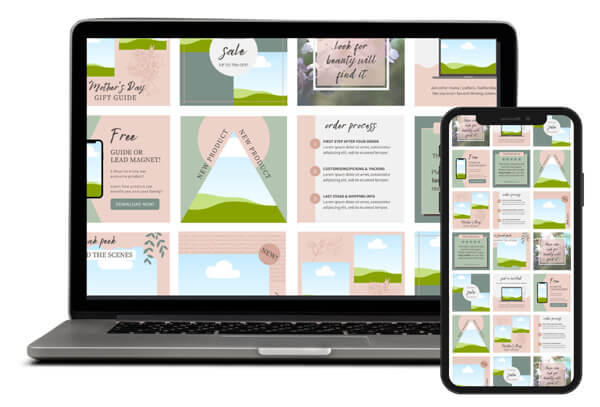

Guest post by Kathryn Moorhouse
Pinterest is an incredible platform for growing your business, driving traffic to your website and products, and reaching new audiences. Keywords are crucial for helping your content get discovered on Pinterest, but using them incorrectly or not using them at all can limit your reach.
Fun fact, Pinterest refers to keywords as annotations. They say that an annotation is a short keyword or phrase between 1-6 words long that describes the subject of a pin.
It’s important to realize that your blog post, product, podcast, insert piece of content here, is not the thing that is shared on Pinterest. Your pin image is shared on Pinterest. That means Pinterest wants to know exactly what your pin is about so that they can serve it in front of the right audience.
That is where your keywords come in.
Pinterest will use the keywords provided in various places to determine, with as much confidence as possible, what the pin is about.
Your job is to make sure Pinterest can easily associate your chosen keywords with your pin. Let’s dive into three common Pinterest keyword mistakes and how to avoid them to maximize your growth and make sure Pinterest knows exactly where to place your pin in the search engine.
One of the most common mistakes is jumping into Pinterest without taking the time to do proper keyword research. Pinterest is a visual search engine, and your keywords are your main tool for helping your content get found. By not identifying relevant and appropriate keywords for your content and topics, you’re missing out on potential visibility.
I know how quickly you may want to get your Pinterest account up and working for you…I’ve been there. But creating boards and Pins without having a solid Pinterest Keyword Strategy means you’re not using the search engine in your favor.
By just taking 1 hour to properly do keyword research and learn where to place your keywords for maximum effectiveness you can increase your reach, traffic, and sales from your Pinterest account.
The key to success on Pinterest is to be able to show up in front of your audience when they’re searching for your solution. You may have the most beautiful pin design but if your pin isn’t being shown under the right keywords (or relevant keywords) then your content won’t get seen.
You want to make Pinterest’s job easier by being the one to take charge of keyword targeting. If you clearly use relevant and targeted keywords in the right places (yes, you’ll want to place the keyword in more than one place) you’ll increase Pinterest’s confidence that this pin should show up under your chosen keywords.
What to Do Instead: There are multiple ways to do targeted keyword research for your Pinterest content. My tip is to always use a few of them in combination because it helps validate your selected keywords.
Start by exploring Pinterest’s search bar.
Type in terms related to the topics your content is about.
Observe the suggested search terms that appear in the dropdown menu and the search terms that appear in bubbles once you hit enter —these are what users are actively searching for.

Tools like Pinterest Trends can also help you see what’s trending within your audience and niche.

Then, create a list of keywords relevant to your business and content that you can use consistently.
| Check out our range of Pinterest Canva Templates
While it’s very important to add keywords to your pin descriptions, that’s not the only place you should be using them.
Many Pinterest users overlook other important areas where keywords are just as essential, such as board names, board descriptions, pin titles, and even the text you put on your pins. Focusing only on the pin descriptions means you’re missing out on several opportunities to optimize your content for search.
Did you know that when you save a pin to a board, Pinterest will use the keywords related to that board to better identify what the pin is about?
Example:
Let’s say your pin is about social media marketing tips and you want your pin to show up under the keyphrase Social Media Marketing.
You’ve added the keyphrase to your pin description and pin title so Pinterest has an idea that it’s about social media marketing.
Now you save this pin to a board on Pinterest called Social Media Marketing and the board description also uses the keyphrase social media marketing.
You’ve now increased Pinterest’s confidence that this keyphrase is HIGHLY relevant to your pin because the keyword was used in the following places: pin description, pin title, board name (for a board it was saved to) and board description (for a board it was saved to).
If you don’t include keywords in places other than the pin description, can you see how you’re missing out on several opportunities to optimize your content for search?
What to Do Instead: Think of keywords as a way to give Pinterest multiple hints about what your content is about. Make sure your keywords are strategically placed in all of these areas:
My favorite tip: Stay organized with your keywords and save time by creating a keyword tracking template to manage your keyword list. Once you have your keywords in one place, and you’ve identified the top keywords for each topic you focus on, you can easily use that list to add the appropriate keywords to the places mentioned above.
Did you know that Pinterest keywords aren’t just for Pinterest?
Pinterest wants to make sure their users see relevant AND good quality content.
I mentioned that you want to give Pinterest multiple hints about what your content is about. This is done by placing your strategically chosen keywords in different places on Pinterest.
Pinterest doesn’t just look for those hints on Pinterest, they also pay attention to your website URL, your website page title, your website page content, etc.
They’re trying to make sure your pin and the content it’s leading to are relevant to the keywords you’re trying to target.
By not using your Pinterest keywords in your website content (specifically the page you’re leading the Pinterest user to), you limit Pinterest’s ability to understand the content’s relevance and push your content to the right audience.
What to Do Instead: Incorporate the appropriate Pinterest keywords you’re using into your website’s meta descriptions, and content. Whether it’s on your blog posts, product descriptions, or service pages, using these keywords helps ensure that your Pinterest account and website are working together seamlessly to attract your target audience.
Let’s use the Social Media Marketing example earlier.
One of the top keywords you want that pin to show up under is Social Media Marketing. You’ve included that keyword in different places on Pinterest to help Pinterest understand what the pin is about.
To increase Pinterest’s confidence that this pin should show up in the search under that keyword, you should make sure that the blog title, blog description, and the blog itself uses the keyword “Social Media Marketing” if possible.
Don’t let these common Pinterest keyword mistakes hold you back from growing your business on Pinterest.
By following the steps I’ve shared above, you can use the Pinterest search engine to get your content seen by your ideal customers.
If you need help getting started, be sure to check out my Simplifying Pinterest Keywords course to take the guesswork out of Pinterest keyword strategies or grab my Pinterest Management Tracking Templates to make managing and tracking your keywords easier.

Share to…

Sign up to get 10 free Canva templates for your social media.
Created with solopreneurs in mind, these templates offer a variety of content types to help boost your online presence!